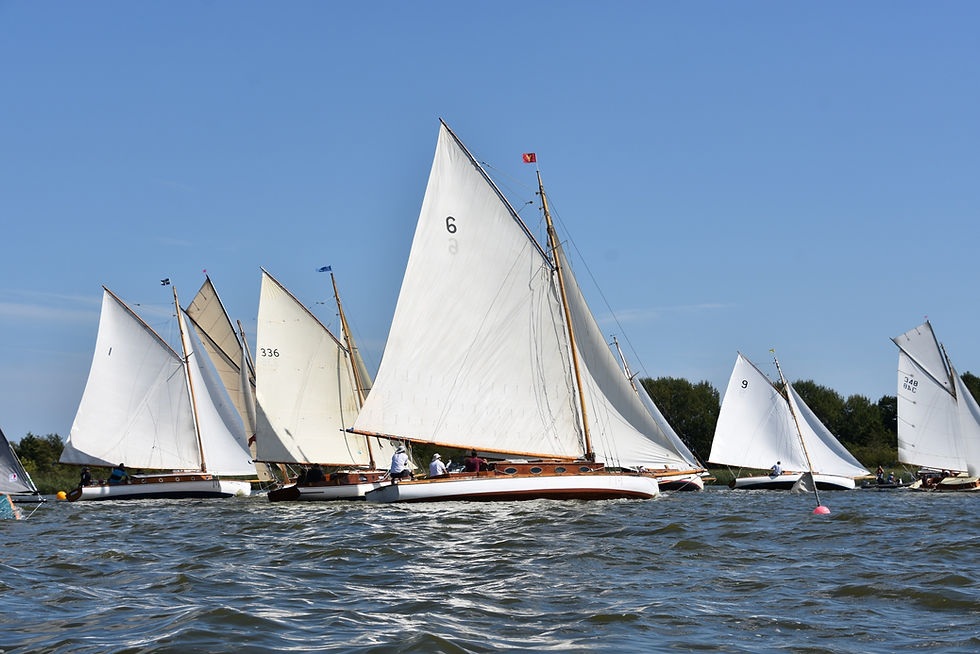TOLLS ON THE BROADS AND OTHER INLAND WATERWAYS
- broadssociety
- Mar 1, 2024
- 7 min read
Updated: Sep 16, 2025
More than 200 navigation authorities look after Britain’s inland waterways. All of these have regulations governing access; many require a licence for boating, using the income to maintain waterway infrastructure. In the case of the Broads Authority, an annual toll is charged, as required by the Norfolk and Suffolk Broads Act 1988. There are 12,000 boats and over 8,000 boat owners who pay these tolls to enjoy over 200km of navigable tidal rivers and more than 60 moorings in the Broads.
Unlike any other navigation authority, the Broads Authority is also responsible for an area of 303 sq km that is designated as the equivalent of a national park and is principally funded through an annual payment from Defra. The Broads Act requires that navigation and park expenditures are kept separate, and that navigation expenditure is equal to navigation income (taking one financial year with another). A strong case has recently been made to Defra for additional funds to pay for some of the public benefits that undoubtedly accrue to the non-boating community from the navigation, but that argument is not germane to our theme.
Over the years, the stringent rules separating the finances of the Broads navigation from those of the surrounding protected area have often led to challenges, particularly from those who are unenthusiastic about the national park designation, fearing a creeping loss of access to the navigation or the use of navigation tolls for park purposes. The issue became exacerbated when the legacy of COVID, high inflation and reduced toll income from the declining hire boat industry stretched the Broads Authority’s budget and triggered decisions by its Members to increase navigation tolls by 13% and 8.5% in 2023/24 and 2024/25, respectively.
The resulting public outcry is a matter of record and known to most readers of this paper, but it came to a head when, in October 2023, the Broads Hire Boat Federation (an association within British Marine) lodged an appeal to the Department of Transport against the increases and the decision-making processes that led up to them. The Broads Authority has refuted the appeal in a (no doubt costly) legal opinion. The Norfolk and Suffolk Boating Association (NSBA), which serves private boat owners, decided in February 2024 that it too would challenge the “rightfulness or otherwise of the Broads Authority’s recent action over tolls” amid “a suspicion that the Broads Authority is misusing tolls money”, by raising funds from its members with a view to consulting a King’s Counsel to investigate the matter.
Neither challenge has yet reached a conclusion (NSBA’s investigation has not begun) and opinions vary widely on both the justification or otherwise of the toll increases and the usefulness of the subsequent investigations. Neither the hire boat industry nor private boat owners can claim a consensus within their ranks at the moment.
On the face of it, the increases, when expressed as a percentage, do appear to be high. This point was emphasised by five Norfolk MPs who, in a letter dated 29 November 2023, reminded the Authority that many local councils cannot raise taxes more than 4.99% without a referendum, a condition that does not apply to the unelected Authority, but ought perhaps to be borne in mind. Whether the tolls are unreasonably high or have fallen disproportionately on hire or private boats remains in dispute.
An element that has been missing in the debate is a clear statement of what the increases have meant in simple cash terms and how the Broads data compare with fees charged in other comparable waterways. To help in the discussions and deliberations, the Broads Society approached the independent Inland Waterways Association with a request for data from comparable navigation authorities.
Twelve waterways, including the Broads, were initially selected by the Inland Waterways Association for this study on tolls as they had the potential to be useful for comparative purposes: Canal and River Trust, Environment Agency (including Thames, Anglian and Medway waterways), Middle Level Commissioners (Middle Level Navigations), National Trust (River Wey Navigation), Basingstoke Canal Authority, part of Hampshire County Council (Basingstoke Canal), The Bridgewater Canal Company Ltd, part of Peel Land & Property (Bridgewater Canal), River Cam Conservancy (River Cam), Essex Waterways (Chelmer & Blackwater Navigation), and Scottish Canals.
The study demonstrated considerable variation in the way navigation charges are calculated and applied across navigation authorities, and comparisons were not straightforward. Every waterway has its own characteristics and challenges affecting maintenance costs and tolls. While the Broads system is strongly impacted by its tidal nature, others are obligated to maintain expensive locks and weirs. The costs and benefits available in very small navigations (such as the Rivers Wey, Avon and Medway) are not to be compared with the variety of recreation facilities and landscapes available in the larger ones. The Scottish Canals are very fragmented, unlike the continuous navigation available on the Broads.

After their initial review of the dozen waterways originally selected, the Inland Waterways Association recommended that a focussed comparison across the five larger navigations with continuous waterways more than 160km (100 miles) in length, (i.e. the Broads, Canal & River Trust, Thames, Anglian and Middle Level Navigations) would potentially be helpful.
Each navigation authority uses its own classification for boats, adding to the difficulty in making comparisons, so the Inland Waterways Association selected two common types and sizes of boats for this study: a small cabin cruiser (7.3m x 2.4m) and a larger cabin cruiser (10.6m x 3.6m). Other boats might have been chosen, but this comparison revealed some interesting information.

What is immediately striking from the table is the low toll for a small private cabin cruiser on the Broads when compared with the four other large navigation authorities. On the Broads, the charge is just £289.34 per year, whereas the charges elsewhere are £410.38 (Thames), £462.18 (Anglian and Middle Level Navigations) and £831.00 (Canal and River Trust).
Looking at the tolls for larger private cabin cruisers, here we also see relatively low charges in the Broads compared to its four peers. The Broads toll of £646.76 compares favourably with the Anglian and Middle Level Navigations (both £818.00), Thames (£917.32) and particularly the Canal and River Trust (£1,127.66).

The low charges on the Broads for private boats must be due in part to the Broads Authority’s November 2016 review of the toll structure, which led to a decision to lower the tolls for some classes because the number of registrations was falling at the time. According to the Broads Authority, this decision is still resulting in lower charges for some boats than was the case ten years ago. There is an argument that the Authority’s toll decisions since 2016 have not kept up with inflation, leading to the inevitable eventual correction. Looking beyond the headline percentage increases of the past two years, however, the cash cost to most private boat owners today remains modest, giving good value when compared with other navigations.
The picture for multi-day hire craft is somewhat different. Thames, Anglian and Middle Level Navigations apply a flat annual surcharge to the private boat fees (around £220.00) for multi-day hire boats. In contrast, the Broads and the Canal and River Trust have separate licence systems for multi-day hire boats. The Broads tolls for a small hire cabin cruiser 7.3m x 2.4m, at £651.78, is very similar to those on the Thames, Anglian and Middle Level navigations. However, the charge for a large hire cabin cruiser, 10.6m x 3.6m, at £1,456.92, is significantly higher than these three other navigations. Charges on the Canal and River Trust navigation, at more than £2K for both boat classes, are much higher than all four other navigations, including the Broads.

The Broads tolls appear to be moderate for owners of small multi-day hire boats, but the picture is more challenging for owners of larger hire boats. It may be argued that these larger boats disproportionately impact the rivers and their boating infrastructure, particularly banks and moorings, thereby justifying these higher charges. Also, it must be noted that large, wide beam hire boats are a rarity on canals, and direct comparisons may not be very meaningful.
On the Broads, we see associations representative of hire boat operators and private boat owners opting for formal appeals and investigations that are costly both directly to their members and to the Broads Authority’s navigation fund, into which their members all pay. Feelings are running high and have perhaps been exacerbated by poor diplomacy and communications on all sides and a lack of considered analysis in the rushed deliberations of the Authority’s Members and its Navigation Committee. These disputes are not helpful at a time when the Broads need to attract more visitors and boatowners after the impact of the COVID pandemic. The Broads Authority needs a sympathetic ear in government at a time when funds for Britain’s waterways are tight and declining in real terms.
Consideration is needed as to where things have gone wrong and how they can be put right. A lack of voice, conversation, discussion, and transparency has led to suspicion, frustration and polarised positions. Insufficient time has been allowed to consult and obtain feedback. Sadly, the investigations underway or about to begin are unlikely to produce agreeable conclusions.
As we approach another round of budgeting and decisions on tolls in the Broads, all sides need a voice and should come constructively to the table to provide information and opinions for the Navigation Committee and Members of the Broads Authority to consider as they reach their decisions. There are many more important challenges that await the attention they deserve from those who love and care for the Broads.

One of the key roles of the Broads Society is to foster educated and informed discussions on all matters related to the region. By joining us, you can support our mission to provide unbiased commentary on issues impacting the Broads, ensuring a balanced and thoughtful dialogue continues to thrive.




Comments